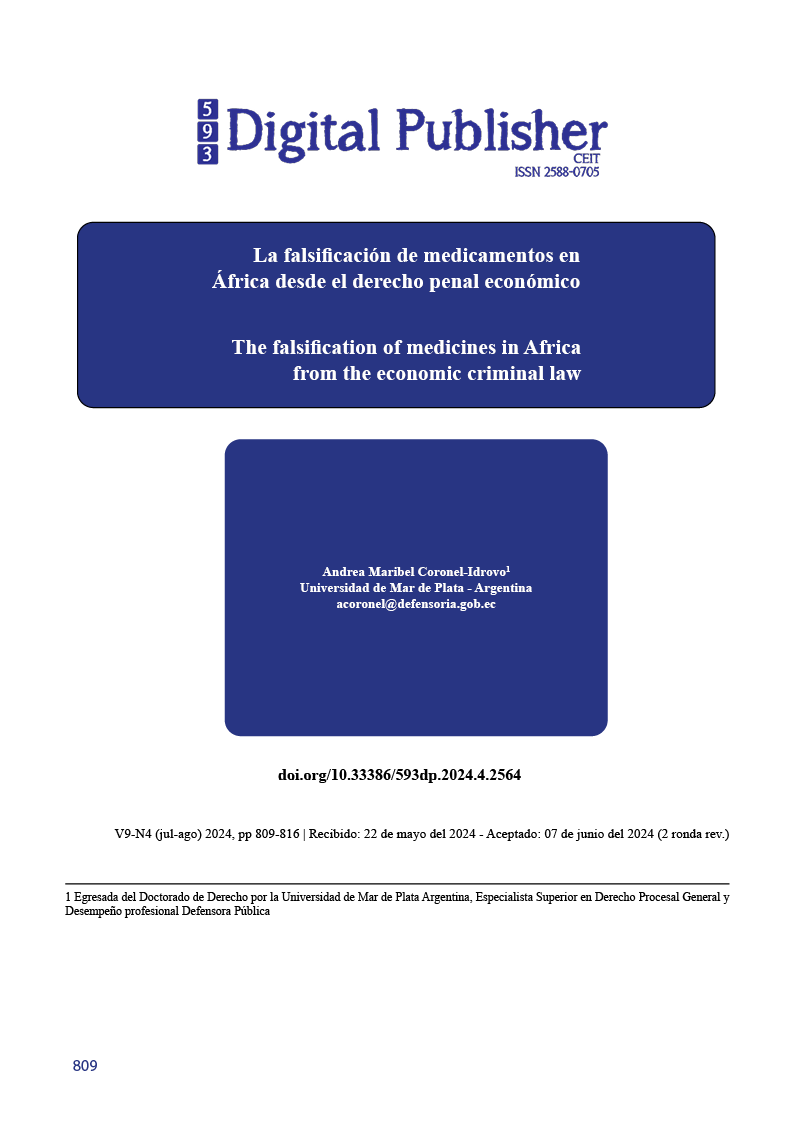The falsification of medicines in Africa from the economic criminal law
Main Article Content
Abstract
The present study on the falsification of medicines in Africa, with special attention to adulterated treatments to treat HIV, is related to economic criminal law in that state interventionism in the economy is a reality that has the need to “protect the interests "ethical-social principles perfectly recognized in every modern state", without forgetting that it is linked to corruption and the fight against that problem.
It is important to note that Economic Criminal Law has its origins at the end of the 19th century and is consolidated in the 20th. It begins politically with the change from the agrarian system to the industrial system, where ideas of an intervening state in the economy begin to be generated, controlling the production, distribution and consumption of goods on a large scale as a consequence of the industrial system. Legally, it has been expressed that its birth occurred with the Weimar Constitution, being the first constitution to speak about economic relevance and generate provisions of an economic nature, an economic constitutional law that is understood as “the set of basic norms intended to provide the legal framework fundamental for the structure and functioning of economic activity or, in other words, for the order and economic process.”
The main characteristics that distinguish economic criminal law are of accessory prevalence in that “the legislation that receives it is mostly scattered in laws of other legal branches”, such is the case of the tax code or health code. In addition to its dynamic and variable characteristic, understanding that legal modifications of codes that regulate social behavior follow the pace of social transformation, seeking to punish intolerable acts, these essential characteristics of economic criminal law are related to the falsification of medicines and treatment. of HIV/AIDS, in the sense that although there are regulations on the falsification of medicines in the Ecuadorian Comprehensive Criminal Organic Code, this is art. 217, it is no less true that since this type of criminal offense exists, we must refer to the code and regulations on the production of medicines than the health code, even to know and understand what falsification entails, fulfilling the characteristic of accessory prevalence; On the topic of dynamics and variables, it is easy to understand the social rejection that counterfeit medicines produce and even more so regarding a chronic and only controllable disease, such as HIV/AIDS. Why there exists in our regulated COIP that behavior even with aggravations on this type of actions, recognizing its dynamics is this topic.
Downloads
Article Details

This work is licensed under a Creative Commons Attribution-NonCommercial-ShareAlike 4.0 International License.
1. Derechos de autor
Las obras que se publican en 593 Digital Publisher CEIT están sujetas a los siguientes términos:
1.1. 593 Digital Publisher CEIT, conserva los derechos patrimoniales (copyright) de las obras publicadas, favorece y permite la reutilización de las mismas bajo la licencia Licencia Creative Commons 4.0 de Reconocimiento-NoComercial-CompartirIgual 4.0, por lo cual se pueden copiar, usar, difundir, transmitir y exponer públicamente, siempre que:
1.1.a. Se cite la autoría y fuente original de su publicación (revista, editorial, URL).
1.1.b. No se usen para fines comerciales u onerosos.
1.1.c. Se mencione la existencia y especificaciones de esta licencia de uso.
References
AMON, J., “Dangerous medicines: Unprove AIDS cures and counterfeit antiretroviral drugs”, en Globalization and Health 2008, pp- 4-5. Citado por: GAMAZO ARAMENDÍA, Carolina. Corrupción y SIDA en África. En: Colección Cuardernos de trabajo sobre el desarrollo SODePAZ, 2009, no. 4, p. 31.
BAJO FERNANDEZ, Miguel – BACIGALUPO, Silvana. Derecho Penal Económico. Madrid: Editorial Universitaria Ramón Areces, 2010, p. 19.
BALCARCE, Fabián. Derecho Penal Económico, Origen multidisciplinario, caracteres y matices de su Parte General [en linea]. En: Centro de Investigación Interdisciplinaria del Derecho Penal Económico, 2007, Córdoba. [citado el 12 de agosto de 2017]. p. 13. Disponible en: http://perso.unifr.ch/derechopenal/assets/files/obrasportales/op_20141108_02.pdf
BOVENKERK, F. (2000). “Wanted: Mafia boss”-Essay on the personology of organized crime. Crime, Law and Social Change, 33, 225-42. Citado por: GIMÉNEZ-SALINAS FRAMIS, Andrea, REQUENA ESPADA, Laura y DE LA CORTE IBÁÑEZ, Luis. ¿Existe un perfil de delincuente organizado? Exploración a partir de una muestra española. [en línea]. Revista Electrónica de Ciencia Penal y Criminología, 2011, núm. 13-03 [citado el 12 de agosto 2017] p. 7. Disponible en: http://criminet.ugr.es/recpc/13/recpc13-03.pdf
ECUADOR. ASAMBLEA NACIONAL. Registro Oficial (10 de febrero de 2014). Código Órganico Integral Penal. Quito,2014, no. 10.
GAMAZO ARAMENDÍA, Carolina. Corrupción y SIDA en África. En: Colección Cuardernos de trabajo sobre el desarrollo SODePAZ, 2009, no. 4, p. 11.
GIMÉNEZ-SALINAS FRAMIS, Andrea, REQUENA ESPADA, Laura y DE LA CORTE IBÁÑEZ, Luis. ¿Existe un perfil de delincuente organizado? Exploración a partir de una muestra española. [en línea]. Revista Electrónica de Ciencia Penal y Criminología, 2011, núm. 13-03 [citado el 12 de agosto 2017] p. 3. Disponible en: http://criminet.ugr.es/recpc/13/recpc13-03.pdf
MOFFITT, T. E. (1993) Adolescence-Limited and Life Course Persistent Anti-Social Behav- ior: A Developmental Taxonomy. Psychological Review, 100, 679-701. Citado por: GIMÉNEZ-SALINAS FRAMIS, Andrea, REQUENA ESPADA, Laura y DE LA CORTE IBÁÑEZ, Luis. ¿Existe un perfil de delincuente organizado? Exploración a partir de una muestra española. [en línea]. Revista Electrónica de Ciencia Penal y Criminología, 2011, núm. 13-03 [citado el 12 de agosto 2017] p. 8. Disponible en: http://criminet.ugr.es/recpc/13/recpc13-03.pdf
MONTERO, luis. El crimen organizado y la falsificación de medicamentos[en linea]. Granada, España,2015[citado el 10 de agosto de 2017]. Disponible en: http://esencialesparalavida.org/2015/10/21/el-crimen-organizado-y-la-falsificacion-de-medicamentos/
ORGANIZACIÓN MUNDIAL DE LA SALUD [OMS]. 62 Asamblea Mundial de la Salud, punto 12.9 del orden del día provisional. (04:2009: Ginebra) p. 3
OTIVEROS ALONSO, Miguel. ¿para que sirve el compliance en materia penal? (Aproposito del código Nacional de Procedimientos Penales)[en linea]. En: Biblioteca Juridica Virtual del Instituto de Investigaciones Juridicas de la UNAM, 2015 [citado el 15 de agosto de 2017]. p. 2. Disponible en: https://archivos.juridicas.unam.mx/www/bjv/libros/9/4032/14.pdf
PNUD, “Objetivos de Desarrollo del Milenio” (http://www.undp.org/spanish/mdg/goal6.shtml), Citado por: GAMAZO ARAMENDÍA, Carolina. Corrupción y SIDA en África. En: Colección Cuardernos de trabajo sobre el desarrollo SODePAZ, 2009, no. 4, p. 16.
RIGHI, Esteban. Derecho penal económico[en linea]. En: Revista Jurídica Unam, 2009[citado el 12 de agosto de 2017]. p. 95. Disponible en: https://archivos.juridicas.unam.mx/www/bjv/libros/1/373/6.pdf


